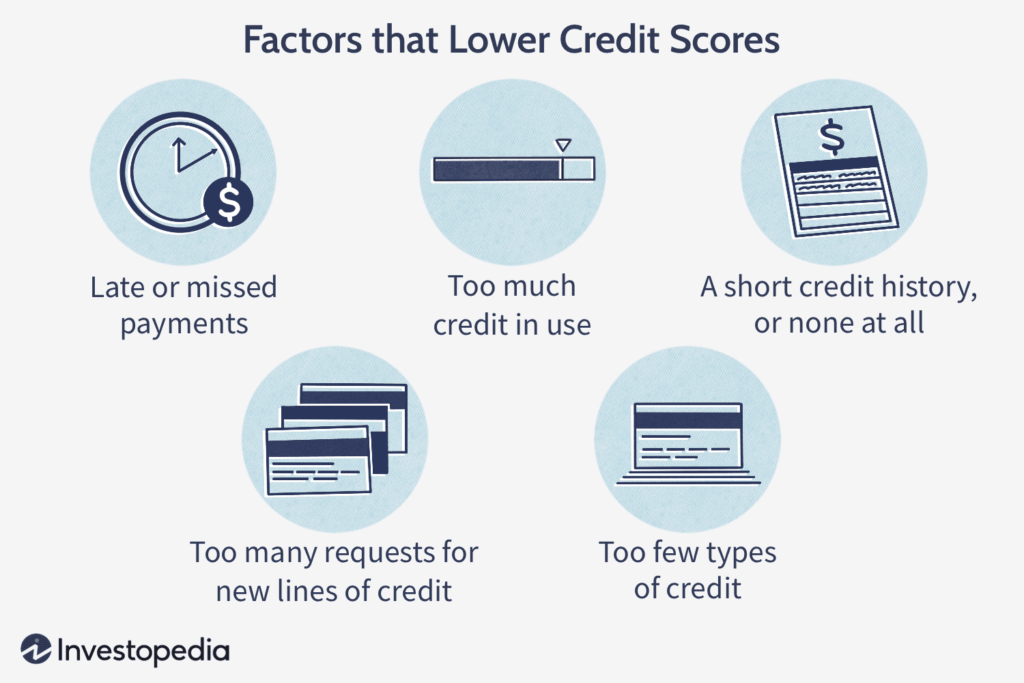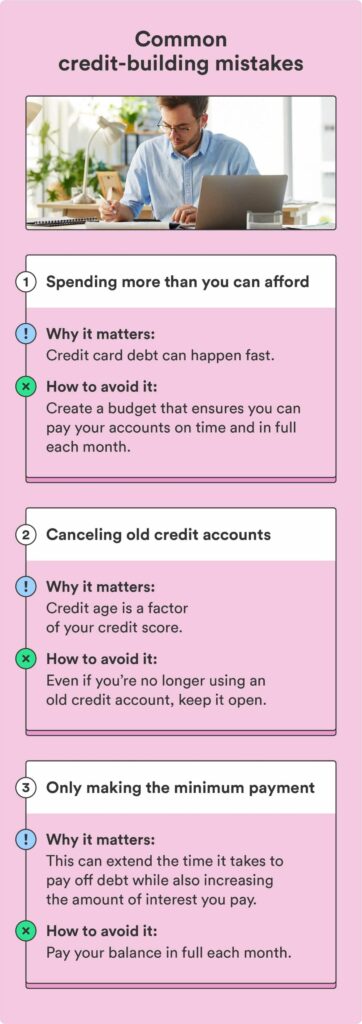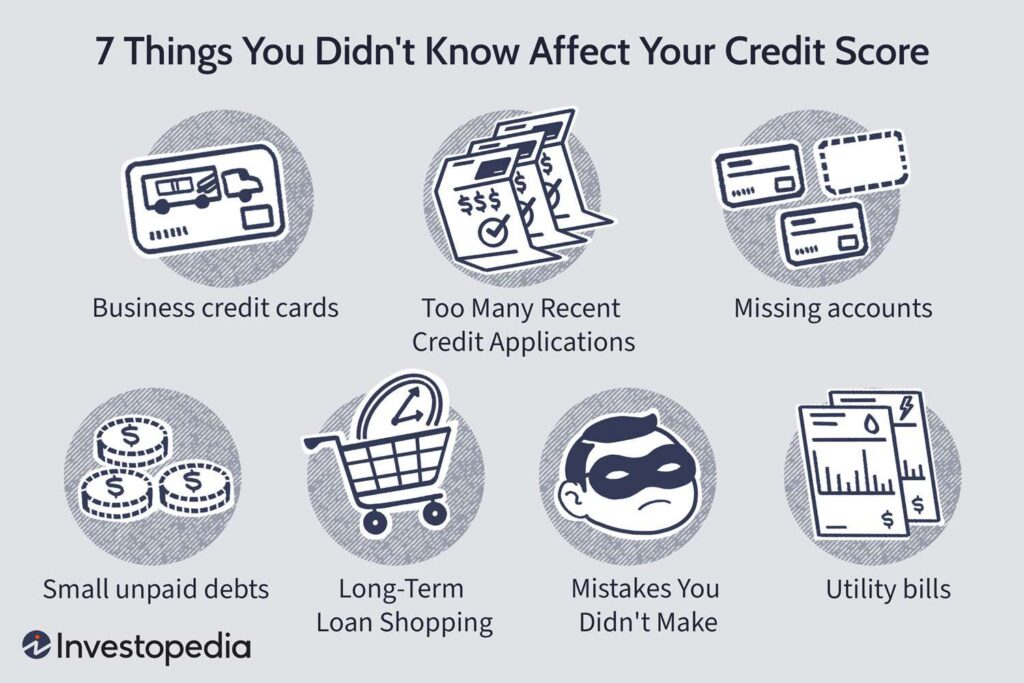So, you’re interested in keeping your credit in tip-top shape? Well, you’ve come to the right place. In this article, we’ll take a closer look at common credit mistakes that many people often make, and more importantly, we’ll dive into practical strategies to help you maintain a healthy credit score. Because let’s face it, your credit score can have a significant impact on your financial well-being, affecting your ability to secure loans, rent an apartment, or even land that dream job.
In a world where credit plays such a vital role, it’s crucial to avoid falling into the traps that can harm your credit score. From excessive credit card debt to missed payments, we’ll discuss the most prevalent errors that can do some serious damage. But fear not, my friend, as we won’t stop at identifying the pitfalls. Our mission is to equip you with the tools and knowledge needed to skirt these obstacles while building and maintaining the credit score of your dreams. So, let’s get started on your journey towards financial success!
Establishing a Good Credit Foundation
Understanding the Importance of Credit
When it comes to your financial well-being, credit plays a crucial role. Your credit history and credit score can impact your ability to secure loans, rent an apartment, or even get a job. It’s important to understand that establishing good credit isn’t just about having the ability to borrow money; it’s about demonstrating your ability to borrow responsibly and manage your financial obligations.
Creating a Budget
One of the first steps in establishing a good credit foundation is creating a budget. A budget helps you track your income and expenses, ensuring that you have enough money to make your monthly payments on time. By knowing how much you can afford to spend and setting aside money for savings, you can avoid falling into debt and maintain a healthy credit score. Remember to include all of your monthly expenses, such as rent, utilities, groceries, and loan payments, when creating your budget.
Opening Your First Credit Account
To build your credit history, it’s essential to have a credit account. This could be a credit card, a student loan, or even a secured credit card. When opening your first credit account, it’s important to choose one that suits your needs and financial situation. Start with a low credit limit and make sure you understand the terms and conditions of the account. Use the credit card sparingly, keeping your balances low, and pay your bill on time and in full each month to demonstrate responsible credit usage.
Making Timely Payments
One of the most critical factors in maintaining a healthy credit score is making timely payments. Late or missed payments can have a serious negative impact on your credit history and can stay on your credit report for up to seven years. Set up payment reminders to ensure you never miss a due date and consider automating your payments to avoid any chance of forgetting. If you find yourself struggling to keep up with your payments, reach out to your creditors for assistance. They may be able to offer a payment plan or alternative arrangement to help you stay on track.
Managing Credit Cards Wisely
Controlling Your Credit Card Balances
When it comes to managing credit cards, it’s important to keep your balances under control. It’s generally recommended to keep your credit card balances below 30% of your credit limit. For example, if you have a credit card with a $1,000 limit, try to keep your balance below $300. Higher credit card balances can negatively impact your credit utilization ratio, which is a significant factor in calculating your credit score.
Using Credit Cards Responsibly
Credit cards can be a useful tool when used responsibly. They can help you build credit history and earn rewards, but they can also lead to debt if not managed properly. To use credit cards responsibly, avoid overspending and only charge what you can afford to pay off in full each month. Avoid unnecessary purchases and make sure to budget for your credit card payments to avoid high-interest charges and potential debt.
Avoiding Credit Card Cash Advances
While credit card cash advances may seem convenient in times of financial need, they should be used sparingly and for emergencies only. Cash advances often come with high fees and even higher interest rates than regular purchases. Additionally, cash advances do not have a grace period like regular purchases, meaning interest starts accruing immediately. It’s best to explore other options, such as personal loans or borrowing from friends or family, before resorting to cash advances on your credit card.

This image is property of www.investopedia.com.
Avoiding Excessive Debt
Borrowing Responsibly
Borrowing money can be necessary at times, whether for education, a car, or a home. However, it’s important to borrow responsibly and only take on what you can comfortably repay. Before taking out a loan, carefully consider your budget, income, and expenses to determine if you can afford the monthly payments. Avoid borrowing an amount that exceeds your needs or overburdens your finances, as this can lead to excessive debt and financial stress.
Considering the 30% Rule
To maintain a healthy credit score and avoid excessive debt, it’s recommended to follow the 30% rule. This rule suggests that you should only utilize up to 30% of your available credit. For example, if you have a total credit limit of $10,000, try to keep your total credit card balances below $3,000. This not only helps to manage your debt-to-income ratio but also shows creditors that you are responsible with your credit usage.
Avoiding Multiple Credit Applications
While it may be tempting to apply for multiple credit cards or loans in a short period, this can actually harm your credit score. Each time you apply for credit, it triggers a hard inquiry on your credit report, which can lower your score temporarily. Additionally, having multiple new accounts can make it seem like you are a higher credit risk. Instead, be selective with your credit applications and only apply for credit when necessary.
Monitoring Your Credit Report
Ordering Your Credit Report
Regularly monitoring your credit report is essential for maintaining a healthy credit score. You are entitled to one free copy of your credit report from each of the three major credit bureaus – Equifax, Experian, and TransUnion – every year. You can order your reports online or by mail, and it’s recommended to stagger your requests throughout the year to keep a constant eye on your credit history.
Checking for Errors
When reviewing your credit report, it’s crucial to check for any errors or discrepancies. Mistakes on your credit report can negatively impact your credit score and potentially harm your creditworthiness. Look for inaccuracies in personal information, account balances, payment history, and any unfamiliar accounts. If you find any errors, report them to the credit bureau and the creditor immediately to have them corrected.
Monitoring Your Credit Score
In addition to monitoring your credit report, keeping an eye on your credit score is essential. Your credit score is a numerical representation of your creditworthiness and is used by lenders to assess your risk as a borrower. Several websites and credit card companies offer free access to credit scores, or you can purchase your score from the credit bureaus. Monitoring your credit score allows you to track your progress, identify areas for improvement, and detect any sudden changes or potential identity theft.

This image is property of s28126.pcdn.co.
Staying Informed
Understanding Credit Utilization
Credit utilization is the ratio of your credit card balances to your credit card limits. It is a significant factor in calculating your credit score, with a lower utilization ratio being more favorable. To understand your credit utilization, divide your total credit card balances by your total credit card limits. For example, if you have $500 in credit card balances and a total credit limit of $2,000, your credit utilization is 25%. It’s important to keep your credit utilization as low as possible to demonstrate responsible credit usage.
Knowing Your Credit Limits
Knowing your credit limits on all of your credit accounts is essential for managing your finances effectively. Make sure to keep track of your credit limits and avoid going over them, as doing so can result in high fees, penalty interest rates, and negative impacts on your credit score. Understand the terms and conditions associated with each of your credit accounts to ensure you stay within your credit limits and avoid any potential penalties.
Being Aware of Credit Inquiries
Whenever you apply for credit, a lender will likely perform a hard inquiry on your credit report. These inquiries are recorded on your credit report and can impact your credit score. While one or two inquiries usually have a minor impact, several inquiries within a short period can be seen as a red flag to lenders. Be mindful of the number of credit inquiries you have and only apply for credit when necessary to maintain a healthy credit score.
Avoiding Late Payments
Setting Up Payment Reminders
Late payments can have a significant negative impact on your credit score, so it’s important to make your payments on time. Setting up payment reminders can help you stay on track and ensure you never miss a due date. You can use calendar alerts, mobile apps, or even automatic reminders from your creditors to notify you when payments are due. By being proactive and setting up these reminders, you can avoid late payments and the potential consequences they bring.
Automating Your Payments
To further minimize the risk of late payments, consider automating your payments. This way, your monthly payments will be deducted automatically from your bank account or charged to your credit card. Automating your payments ensures that they are made on time, even if you forget or are unable to manually make the payment. Just remember to keep track of your account balances and ensure there are sufficient funds to cover your scheduled payments.
Contacting Creditors for Assistance
If you find yourself struggling to make your payments on time, don’t hesitate to contact your creditors for assistance. Many creditors have hardship programs or alternative payment arrangements available to help individuals who are facing financial difficulties. Reach out to your creditors as soon as possible if you need help, as they may be able to offer temporary payment deferrals, lower interest rates, or modified payment plans to accommodate your situation.

This image is property of www.truenorthwealth.com.
Handling Collections and Negative Information
Managing Collections
If you’ve fallen behind on your payments, it’s possible that your account may be sent to collections. When dealing with collections, it’s important to address the issue promptly. Contact the collections agency to understand your options and negotiate a repayment plan if possible. Paying off the debt in full can help resolve the issue and prevent further damage to your credit. Remember to keep documentation of all interactions and payments made to ensure accuracy in your credit report.
Negotiating with Creditors
If you’re struggling to make payments or facing financial hardship, it may be possible to negotiate with your creditors. Explaining your situation and proposing a modified payment plan can often lead to a more manageable arrangement. Creditors want to work with borrowers who are proactive and committed to resolving their financial obligations. Be prepared to provide documentation to support your case, such as proof of income, and be open to compromise to reach a mutually beneficial solution.
Removing Negative Information
Negative information, such as late payments or collection accounts, can stay on your credit report for up to seven years. However, there are circumstances where you may be able to have negative information removed. If you believe there is incorrect or outdated information on your credit report, you can dispute it with the credit bureaus. They will investigate your claim and remove any inaccuracies if proven to be incorrect. It’s important to regularly review your credit report to identify any negative information that should be addressed.
Maintaining a Healthy Credit Mix
Diversifying Your Credit Accounts
Having a healthy credit mix is beneficial for your credit score. It shows that you can manage different types of credit responsibly. Consider diversifying your credit accounts by having a mix of credit cards, loans, and mortgages. However, remember to only take on what you can comfortably handle, as excessive credit can lead to financial strain if not managed properly.
Using Different Types of Credit
Using different types of credit can also help demonstrate your creditworthiness. For example, having a mix of installment loans, such as a car loan or student loan, along with revolving credit, like credit cards, shows that you can handle different types of debt responsibly. Just make sure to make your payments on time and avoid taking on more credit than you can manage.
Being Cautious with New Credit
While it’s important to have a healthy credit mix, it’s equally important to be cautious with new credit. Opening too many new accounts within a short period of time can be seen as a sign of financial instability and can negatively impact your credit score. Before applying for new credit, carefully consider if it is necessary and if you can comfortably manage the additional financial responsibility. Only take on new credit when it aligns with your long-term financial goals and you are confident in your ability to repay it.

This image is property of www.chime.com.
Knowing When to Seek Professional Help
Identifying Warning Signs
If you’re struggling with credit management or facing overwhelming debt, it’s important to know when to seek professional help. Warning signs may include consistently being unable to make payments, receiving collection calls, or feeling overwhelmed by your financial situation. Recognizing these signs early on can help prevent further damage to your credit and allow for a quicker path to financial recovery.
Considering Credit Counseling
Credit counseling can be a valuable resource for individuals seeking guidance and assistance with their credit. Credit counseling agencies provide financial education, debt management plans, and personalized advice to help individuals gain control of their finances. They can also negotiate with creditors on your behalf, helping to lower interest rates, waive fees, or arrange more affordable repayment terms. However, be cautious when selecting a credit counseling agency and ensure they are reputable and accredited.
Working with Credit Repair Companies
In some cases, individuals may turn to credit repair companies for assistance with their credit. These companies often promise quick credit fixes and the removal of negative information from your credit report. It’s essential to approach credit repair companies with caution, as some may engage in unethical practices or charge exorbitant fees. Before working with a credit repair company, research their reputation, read reviews, and confirm their legitimacy. Remember, there is no overnight fix for credit repair, and any legitimate improvements will take time and effort on your part.
Understanding the Long-Term Effects
Building a Solid Credit History
Establishing and maintaining a solid credit history takes time and effort, but it pays off in the long run. A strong credit history opens doors to better interest rates, higher credit limits, and more favorable borrowing terms. By consistently demonstrating responsible credit behavior, such as making payments on time and keeping balances low, you’ll establish a positive credit history that will benefit you for years to come.
Recovering from Financial Setbacks
Life is full of unexpected challenges that can have a significant impact on your finances. Whether it’s a job loss, a medical emergency, or a natural disaster, recovering from financial setbacks can be challenging. During these times, it’s crucial to communicate with your creditors and develop a plan to manage your debt. Seek assistance from reputable organizations and professionals to guide you through the recovery process and help you rebuild your credit.
Planning for Future Credit Goals
Maintaining a healthy credit score goes beyond just avoiding mistakes; it also involves planning for your future financial goals. Whether you’re saving for a down payment on a home, planning to start a business, or considering further education, having good credit will make it easier to achieve your goals. By continuing to practice responsible credit habits, you’ll be better prepared to take advantage of future opportunities and secure your financial future.
In conclusion, establishing a good credit foundation and managing credit wisely are essential for maintaining a healthy credit score. By understanding the importance of credit, creating a budget, opening your first credit account, and making timely payments, you lay the groundwork for a solid credit history. Avoiding excessive debt, monitoring your credit report, and staying informed about credit utilization, credit limits, and credit inquiries will help you maintain good credit standing. In cases where you need assistance, knowing when to seek professional help and understanding the long-term effects of credit management will guide you on your financial journey. With knowledge and careful planning, you can avoid common credit mistakes and maintain a healthy credit score to achieve your future financial goals.

This image is property of www.investopedia.com.
